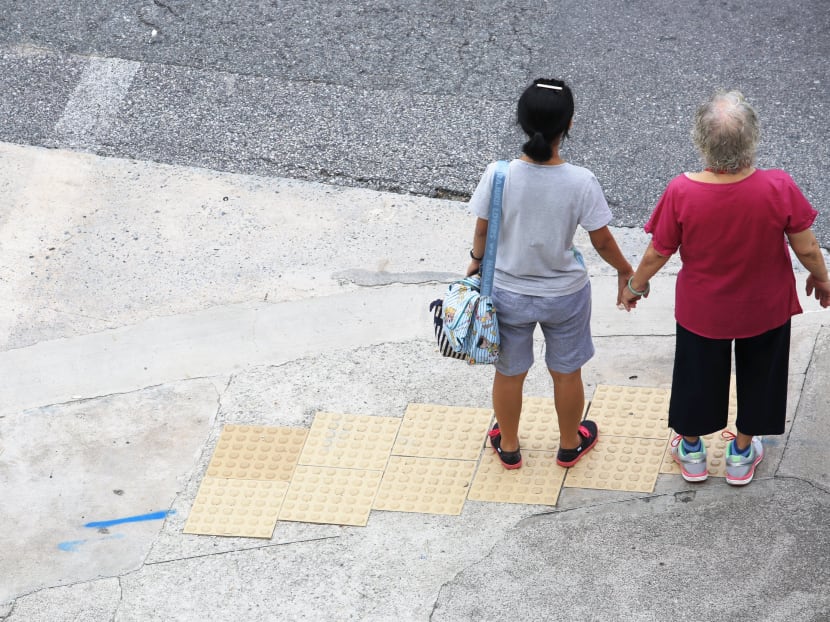Better aged-care option needed apart from nursing homes: Study
SINGAPORE — Make home-care services more accessible to seniors living in studio and two-room flats by locating a small care team at the foot of the housing block, or build homes where eight to 10 seniors can live together in single- or twin-bed rooms while being looked after by live-in caregivers.
SINGAPORE — Make home-care services more accessible to seniors living in studio and two-room flats by locating a small care team at the foot of the housing block, or build homes where eight to 10 seniors can live together in single- or twin-bed rooms while being looked after by live-in caregivers.
These were some of the suggestions that emerged from in-depth interviews done with 50 long-term care experts, who urge a shift away from the current model of “safe but soulless” mega nursing homes, in a study jointly commissioned by the Lien Foundation and Khoo Chwee Neo Foundation.
The 130-page report also included suggestions to restructure the financing model to incentivise nursing homes, so that they are encouraged to rehabilitate and discharge residents where possible, and be rewarded for improving their residents’ conditions, similar to what countries such as Japan and the United States do.
And in a move away from over-stringent health and safety conditions which might be unnecessary for medically stable patients in a long-stay facility, the report called for nursing homes to be taken out of the purview of the Private Hospitals and Medical Clinics Act, to go under a new law which oversees long-term care facilities.
This study comes at a time when Singapore is seeing a growing number of older residents, with nearly 490,000 people aged 65 and above now, up from around 350,000 just five years ago.
Just last week, the first government-run nursing home, Pearl’s Hill Care Home, was launched. It has a 130-bed capacity.
Singapore has nursing-home beds to accommodate about 7 per cent of those aged 75 and above, and there is an urgent need to create more alternatives beyond nursing homes, such as affordable “home-like” assisted living options, the study’s author and researcher Radha Basu said at a media briefing yesterday.
Private-sector players should be encouraged to offer innovative, value-for-money choices for those who do not qualify for government subsidies or want to opt for private nursing-home care.
To ease the manpower crunch — given the diminishing supply of resident workers, low pay and heavy workloads — both minimum staffing ratios and starting salaries for foreign nursing homes should also be raised, the report said.
More crucially, nursing homes should be less dependent on foreign workers, by building a “local care industry” such as hiring retirees, housewives with grown-up children, and former caregivers as full-time or part-time care workers. They may be given incentives such as discounted fees if they need professional care, the report added.
Ms Lai Foong Lian, head of Jamiyah Nursing Home, said at the media briefing that there should be more “person-centric” care to provide a “better quality of life”, instead of being too focused on disease management. For instance, seniors should be free to form their own hobby groups, while representatives of residents and their families should be involved in the nursing home’s planning committees to have a greater say in the running of their “home”.
Singapore should also pilot nursing homes that offer subsidised single- or twin-bed rooms that provide privacy, resemble people’s own homes, and offer access to windows, natural light and greenery, the report stated.
In pushing for conversations on this issue, Lien Foundation’s CEO Lee Poh Wah acknowledged that society might be too busy chasing “performance indicators” in building enough nursing homes for the future, which might create the illusion of a “sense of progress”.
The “self-silencing” mindset for fear of retaliation might make it hard for people to speak up about conditions in nursing homes, he added.
Dr Philip Yap, director of the Geriatric Centre at Khoo Teck Puat Hospital, said it would take time for mindsets to become less “task-oriented”.
“That time we spend writing (reports) could be used for spending with residents, to build relationships and attend to their personal needs,” said Dr Yap.







